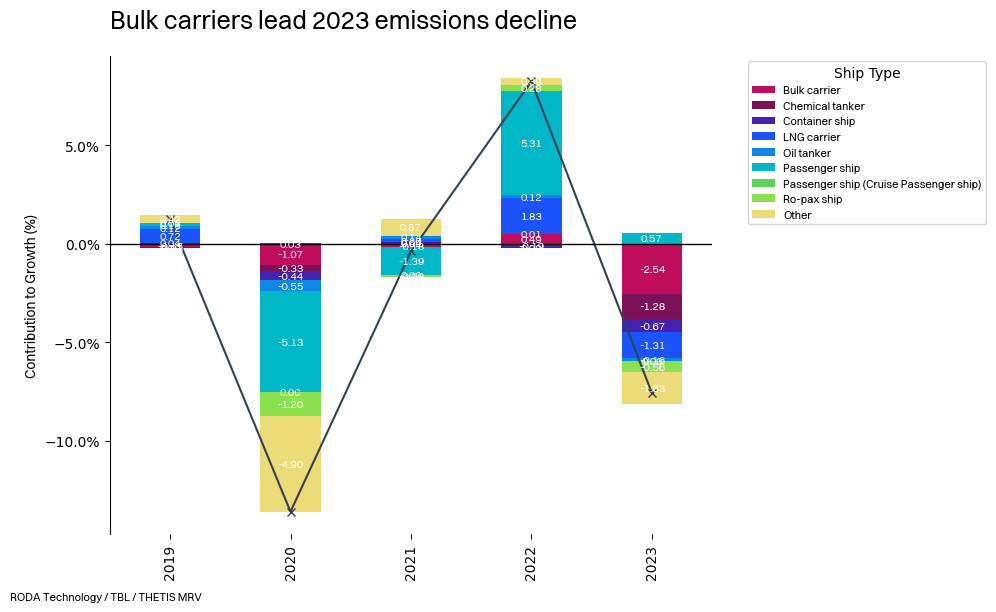2023 Maritime Emissions: Significant Reductions Led by Bulk Carriers, With Passenger Ship Growth Highlighting Ongoing Challenges
Significant emissions reduction: In 2023, the maritime sector saw an 8% overall decrease in CO₂ emissions, driven by bulk carriers and chemical tankers.
Passenger ship emissions growth: Despite the overall decline, passenger ships (excluding cruise ships) contributed to emissions growth, reflecting increased activity in this segment as travel continues to recover.
Sustainability progress: The fall in cruise ship emissions and reductions across most ship types show that the industry is making strides toward sustainability, though challenges remain in passenger travel.
As part of our ongoing efforts to provide insightful maritime emissions data, we are excited to announce the latest update to our dashboard, featuring 2023 data from the THETIS MRV platform. This update, developed in partnership with the TBL Group, enhances our ability to deliver key insights into CO₂ emissions, fuel consumption, and the performance of the European shipping industry. Together with TBL, we continue to lead the way in providing actionable data, shedding light on the trends and challenges shaping the maritime sector’s journey towards sustainability.
The THETIS MRV platform is a European Union initiative designed to monitor, report, and verify CO₂ emissions from large ships operating within the European Economic Area. It serves as a critical tool for tracking fuel consumption and emissions data, ensuring compliance with the EU’s regulations on maritime emissions. By providing transparent and reliable data, THETIS MRV plays a crucial role in reducing the environmental impact of shipping, a sector responsible for significant greenhouse gas emissions. The insights gained from this data enable policymakers, businesses, and other stakeholders to make informed decisions to drive sustainability efforts across the industry.
What's new?

The 2023 data from the THETIS MRV platform reveals a significant shift in maritime emissions, with a notable 7.6% decrease in total CO₂ emissions compared to the previous year. This decline comes after a sharp 8.2% increase in 2022, reflecting the recovery in global shipping activities following the COVID-19 pandemic. However, the drop in 2023 suggests that the industry is beginning to make measurable progress in its efforts to reduce its carbon footprint, likely due to stricter regulatory measures and the adoption of more efficient technologies. This shift aligns with global initiatives such as the International Maritime Organization’s (IMO) 2030 decarbonization goals, which aim to cut greenhouse gas emissions by at least 40% compared to 2008 levels. The progress in 2023 indicates that the maritime sector is increasingly adopting cleaner fuels, optimising ship design, and using digital technologies to improve operational efficiency and reduce emissions.
Emissions Dynamics by Ship Type in 2023
The 2023 data reveals a notable shift in emissions trends across different ship types, with reductions driven primarily by bulk carriers and passenger ships. Bulk carriers, which are responsible for transporting large quantities of cargo like coal, iron ore, and grains, contributed -2.54% to the overall reduction in emissions. This suggests an industry-wide effort to enhance fuel efficiency and transition towards more sustainable practices in these large cargo vessels.
Passenger ships, including both cruise ships and Ro-pax ships, also played a significant role in lowering emissions. Passenger ships contributed a -1.28% reduction, while Ro-pax ships saw a -1.63% decline. This marks a clear departure from 2022, when passenger ships were gradually returning to service post-pandemic, contributing to a notable increase in emissions. The sharp reduction in 2023 likely reflects increased regulatory pressure on the cruise industry to adopt greener practices, as well as lower overall activity in this sector compared to the rebound of the previous year.
In contrast, oil tankers, which showed a strong growth contribution in 2022, had a minimal impact on the overall emissions change in 2023. The 2022 surge in emissions, particularly from container ships (which contributed a 5.31% increase), was largely due to the global recovery in trade and shipping demand post-pandemic. However, by 2023, these growth contributions were tempered, signalling a shift towards more regulated and efficient shipping operations across multiple sectors.

In 2023, the maritime sector experienced an overall 8% reduction in CO₂ emissions, driven primarily by significant cuts from bulk carriers and chemical tankers. Bulk carriers, which are responsible for transporting large quantities of raw materials, contributed a -2.54% decrease, reflecting improvements in fuel efficiency and operational practices. Other ship types, including cruise ships, saw emissions fall as well, with cruise ships making a positive contribution to the overall reduction. The decreased emissions from this sector indicate increased efforts toward environmental sustainability and the adoption of cleaner technologies.
However, emissions from other passenger ships (excluding cruises) grew in 2023, adding 0.57% to overall emissions. This growth highlights the rising activity in non-cruise passenger travel, which offset some of the gains made by other ship types. Despite this, the overall picture for 2023 remains positive, with emissions falling as the maritime industry continues to prioritise cleaner operations and regulatory compliance.
The 2023 data from the THETIS MRV platform paints a promising picture of the maritime sector’s progress in reducing its environmental impact. Significant reductions in CO₂ emissions from bulk carriers and chemical tankers were the main drivers of the overall 8% decline in emissions, reflecting the industry’s growing focus on efficiency improvements and compliance with stricter environmental regulations.
However, the growth in emissions from passenger ships serves as a reminder that certain segments of the sector still face challenges in curbing their carbon footprint. As non-cruise passenger traffic continues to recover, addressing emissions from these vessels will be critical to meeting long-term sustainability goals. The fall in cruise ship emissions is a positive development, likely a result of advancements in cleaner fuel technologies and operational efficiency.
Looking ahead, the shipping industry must maintain momentum in emissions reduction efforts while focusing on segments that continue to drive growth. Collaboration between regulators, industry leaders, and technology providers will be essential in pushing the entire sector toward more sustainable practices. The 2023 data offers clear evidence that progress is being made, but it also underscores the ongoing work needed to ensure all areas of the maritime industry align with global decarbonisation targets.

